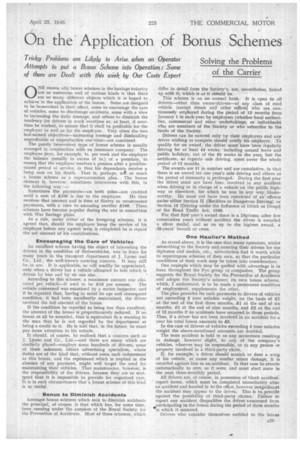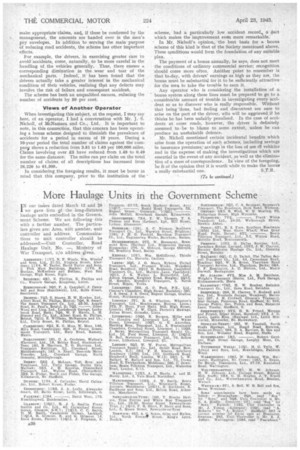On the Application of Bonus Schemes
Page 31

Page 32

If you've noticed an error in this article please click here to report it so we can fix it.
Tricky Problems are Likely to Arise when an Operator Attempts to put a Bonus Scheme into Operation : Some of them are Dealt with this week by Our Costs Expert ONE reason why bonus schemes in the haulage industry are so numerous and of various kinds is that there are so many different objects which it is hoped to achieve in the application of the bonus. Some are designed to be benevolent in their effect, some to encourage the care of vehicles, some to discourage accidents, some with a view to increasing the daily tonnage, and others to diminish the tendency for drivers to work overtime or, at least, if overtime be worked, to ensure that it shall be profitable for the employer as well as for: the employee. Very often the two last-named objectives_—increasing tonnage and diminishing unprofitable or unproductive eve-time—are combined.
The purely benevolent type of bonus scheme is usually arranged in conjanction with an insurance company. The employee pays, for example, Is, per week and the employer the balance (usually in excess of Is.) of a premium, to ensure that the employee receives a pension after a predetermined period of service, Or that his dependants receive a lump sum on his death. That is, perhaps, net so much a bonus scheme as a superannuation plan. . The bonus element is, however, sometimes interwoven with this, in the following way :— Sometimes the payments—on both sides—are credited until a sum of £100 is due to the employee. He then receives that amount and is then at liberty to recommence payments, with a view to amassing another £100. • These schemes have become popular during the war in connettion with War Savings plans.
As a rule, under either' of the foregoing schemes, it is agreed that, should the employee leave the service of his employer before any agreed term is completedhe is repaid the net amount of his contributions.
Encouraging the Care of Vehicles An excellent scheme having the object of interesting the drivers in the condition of their-vehicles, was in force for many years in the transport department of J. Lyons and Co., Ltd., the well-known catering concern. It may still be. in use. It is applicable, as will readily be appreciated, only when a driver has a vehicle allocated to him which is driven by him and by no one else.
According to this scheme, a maximum amount was allo cated per vehicle—it used to be £16 per annum. The vehicle concerned was examined by a motor inspector, and if he reported that, having in mind its age and consequent condition, it had been excellently maintained, the driver received the full amount of the bonus.
If the condition be reported as being less than excellent, the amount of the bonus is proportionately reduced. If no bonus at all be awarded, that is equivalent to a warning to the man that he is not regarded by the department as being a credit to it. He is told that, in the future, lie must pay more attention to his vehicle.
It should, of course, be realized that a concern such as J. Lyons and Co., Ltd.—and there are many which are similarly placed—employs some hundreds of drivers; some of them salesmen, others advertising specialists, whose duties are of the kind that, without some such inducement as this bonus, and the reprimand which is implied in the absence of any payment, might well forget the need for maintaining their vehicles. That maintenance, however, is the responsibility of the drivers, because they are so scattered that it is impossible to provide for organized care. It is in such circumstances that a,bonus scheme of this kind is so useful.
Bonus to Diminish Accidents Amongst bonus schemes which seek to diminish accidents the principal, of course, is that which has, for some time, been running under the auspices of the Royal Society for the Prevention of Accidents. Most of these schemes, which differ in detail from the Society's, are, nevertheless, linked up with it, which is as it shbuld be This scheme is on an annual basis. It is open to all drivers—other than owner-drivers—of any class of road vehicle (except steam and other rollers) who are continuously employed during the period of 12 months front 'January 1 in each year by employers (whether local authorities, commercial and other undertakings, or individuals) who are members of the Society or who snbscribe to the funds of the Society.
Drivers can be entered only by their employers and any driver wishing to compete should notify his employer. To qualify for an award, the driver must have been regularly driving for at 'least 44 weeks, including annual leave and public holidays, out of the 52 weeks in the year, but the certificate, as regards safe driving, must cover the whole period of 12 months.
The awards are 11 in number and are cumulative, in that there is an award for one year's safe driving and others as the period of immunity is prolonged. During the first year the driver must not have beer. involved in any accident when driving or in charge of a vehicle on the public highway or elsewhere, for which he was in any way blameworthy. He must not have been convicted of an offence under either Section H (Reckless or Dangerous Driving) or Section 15 .(Driving under the Influence of Drink or Drugs) of the Road Traffic Act, 1930.
For that first year's award there is a Diploma; after five consecutive years without accident the driver is awarded a silver medal, and so on up to the highest award, a .25-years' brooch or cross One Haulier's Method As stated above, it is the case that many operators, whilst subscribing to the Society and entering their drivers for the diplomas and medals, etc., nevertheless find it worth while to superimpose schemes of then own, so that the particular conditions of their work may be taken into consideration.
One example which may be quoted with advantage is in force throughout the Pye group of companies. The group supports the Royal Society for the Prevention of Accidents and adopts the Society's scheme; its own bonus scheme, which, I understand, is to be made a permanent condition of employment, supplements the other.
The plan provides for cash payments to drivers of vehicles not exceeding 5 tons unladen weight, on the basis of £1 at the end of the first three months, £1 at the end of six months, £1 at the end of nine months, and £2 at the end of 12 months if no accidents have occurred in those periods. Thus, if a driver has not been involved in an accident for a year his total bonus amounts to £5.
In the case of drivers of vehicles exceeding 5 tons unladen weight the above-mentioned amounts are doubled.
The term accident is held to ne any occurrence resulting in damage, however slight, to any of the company's vehicles, whoever may be responsible, or to any person or property involved in a third-party claim.
If, for example, a driver should scratch or dent a wing of his vehicle, or cause any similar minor damage, it is recorded against him as an, accident. In that case he reverts automatically to zero, as it were, and must start anew in the next three-monthly period.
All drivers are, of course, in possession of blank accidentreport forms, which must be completed immediately after an accident and handed in to the office, however insignificant the accident may appear to the driver. This is to, provide against the possibility of third-party claims. Failure to report any accident disqualifies the driver concerned from participating ins the bonus during the period of three months °in which it occurred.
Drivers who consider themselves entitled to the bonus make appropriate claims, and, if these be confirmed by the management, the amounts are banded over in the men's pay envelopes. In addition to serving the main" purpose of reducing road accidents, the scheme has other important effects.
For example, the drivers, in exercising greater care to avoid accidents, come, naturally, to be more careful in the handling of the vehicles generally. Thus, there ensues d corresponding diminution in the wear and tear of the mechanical parts. Indeed,. it has been found that the drivers actually take a greater interest in the mechanical condition of their vehicles, realizing that any defects may involve the risk of failure and consequent accident.
The scheme has beet an unqualified success, reducing the number of accidents by 50 per cent.
Views of Another Operator
When investigating this subject, at the request. I may say here, of an operator, I had a conversation with Mr. J. S. Nicholl, of McNamara and Co., Ltd. It is important to note, in this connection, that this concern has been operating a bonus scheme designed to diminish the prevalence of accidents for a period in excess of 10 years. During a 10-year period the total number of claims against the company shows a reduction from 3.81 to 1.63 per 100,000 miles. Claims involving over £5 have reduced from 1.49 to 0.49 for the same distance; The miles run per claim on the total number of claims of all descriptionshas increased from 26,220 to 61,300..
• In considering the foregoing results, it must be borne in mind that this company, prior to the institution of the
scheme, had a particularly low accident record, a -fact which makes the improvement even more remarkable.
• In Mr. Nicholls opinion, the best basis for a bonus scheme of this kind is that of the Society mentioned above. These conditions would form the foundation al any suitable plan, The payment of a bonus annually, he says, does not meet the conditions of ordinary commercial service; recognition should come more often. Another point to remember is that to-day, with drivers' earnings as high as they are, the bonus must be substantiaJ for it to he sufficiently attractive for the men to take the trouble to earn it.
Any operator who is considering the installation of a
bonus system along these lines must be prepared to go to a considerable amount of trouble in investigating every accident so as to discover who is really responsible. Without that being 'done, bad feeling and discontent are sure to arise on the part of the driver, wit° will be aggrieved.if he thinks he has been unfairly penalized. In the case of accidents at cross roads, however, the driver is definitely assumed to be to blame to some extent, unless he can produce an unshakable defence.
Mr. Nichol] mentioned certain incidental benefits which
arise from the operation of such schemes, including savings in insurance premiums,savings in the loss of use cilf vehieles and in the expense of making the investigations which are essential in the event of any accident, as well as the elimination of a mass of correspondence. In view of the foregoing, ie b of the opinion that it is worth while to make the bonus a really substantial one.




















































